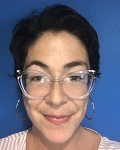2018, 2022
Robin M. Garcia

Position Description
The Los Angeles County Arts Commission (LACAC) fosters excellence, diversity, vitality, understanding, and accessibility of the arts in Los Angeles County by funding 364 nonprofit arts organizations through a two-year $9 million grant program, running the largest arts internship program in the country, coordinating the LA County Arts Education Collective, managing the County’s civic art policy, and producing free community programs. There are over 2,800 arts organizations and 150,000 working artists in the County of Los Angeles, creating the largest concentration of arts activity in the United States. One of LACAC’s most recent initiatives is to place artists, art administrators, or other creative workers who are representative of diverse constituencies in paid positions as creative strategists in County departments to develop innovative solutions to social challenges. The Cross Sector Analyst primarily provides program and evaluation support to this initiative. The analyst also provides research and evaluation support to the Arts Commission’s full Cultural Equity and Inclusion Initiative, working with every division to identify promising practices and share them with the field in Los Angeles and nationally.
Dissertation Abstract
"Community and Cultural Collectives in Contemporary Venezuela"
This dissertation explores how Venezuelan cultural and grassroots projects including community media, cultural collectives, and community museums are at the forefront of recuperating anti-colonial Venezuelan history. The 1998 election of President Hugo Chavez shattered elite versions of Venezuelan history and under Chavez’s government’s (1998-2012), initiatives such as a new progressive constitution that was drafted in 1999, and the government nationalization of the oil industry were met with opposition from the country’s elite, which climaxed in the April 2002 attempted coup against Chavez. Corporate media outlets backed the coup by taking over state-sponsored stations to air soap operas and cartoons while Chavez was kidnapped. In response, grassroots media took on the responsibility of mobilizing Chavez supporters to bring him back to power. Two days after Chavez was reinstated as president on April 13, 2002, the government recognized the importance of democratized media, and began to legalize and financially support community media stations.
This project focuses on community media and cultural collectives in the rural states of Lara, Yaracuy, and the capital-Caracas between 2008-2012. It argues that community control over information-producing institutions; community media, cultural and art collectives, are shaping new and unique relationships between grassroots communities and the government, ones that allow for a democratization of knowledge production away from the traditional archive. These collectives have become living manifestations of histories of resistance that are very black and very indigenous and decenter western understandings of the individual, time, and space.
Additionally, this project draws from the interdisciplinary field of Cultural Studies, and is grounded in Latin American Studies, Transnational, and Globalization Studies. I look to a Transnational and Globalization Studies perspective to think through emerging questions around culture, race, empire, and revolution in the context of Venezuela. I also pulled on other fields within the context of Cultural Studies, such as Performance studies, and Africana/African spiritual traditions to shape my analysis of how these revisionist projects can be seen as a living archives, sites for decolonial healing, and how they speak to the history of resistance and survival of African and Indigenous Venezuelans.
This dissertation explores how Venezuelan cultural and grassroots projects including community media, cultural collectives, and community museums are at the forefront of recuperating anti-colonial Venezuelan history. The 1998 election of President Hugo Chavez shattered elite versions of Venezuelan history and under Chavez’s government’s (1998-2012), initiatives such as a new progressive constitution that was drafted in 1999, and the government nationalization of the oil industry were met with opposition from the country’s elite, which climaxed in the April 2002 attempted coup against Chavez. Corporate media outlets backed the coup by taking over state-sponsored stations to air soap operas and cartoons while Chavez was kidnapped. In response, grassroots media took on the responsibility of mobilizing Chavez supporters to bring him back to power. Two days after Chavez was reinstated as president on April 13, 2002, the government recognized the importance of democratized media, and began to legalize and financially support community media stations.
This project focuses on community media and cultural collectives in the rural states of Lara, Yaracuy, and the capital-Caracas between 2008-2012. It argues that community control over information-producing institutions; community media, cultural and art collectives, are shaping new and unique relationships between grassroots communities and the government, ones that allow for a democratization of knowledge production away from the traditional archive. These collectives have become living manifestations of histories of resistance that are very black and very indigenous and decenter western understandings of the individual, time, and space.
Additionally, this project draws from the interdisciplinary field of Cultural Studies, and is grounded in Latin American Studies, Transnational, and Globalization Studies. I look to a Transnational and Globalization Studies perspective to think through emerging questions around culture, race, empire, and revolution in the context of Venezuela. I also pulled on other fields within the context of Cultural Studies, such as Performance studies, and Africana/African spiritual traditions to shape my analysis of how these revisionist projects can be seen as a living archives, sites for decolonial healing, and how they speak to the history of resistance and survival of African and Indigenous Venezuelans.

